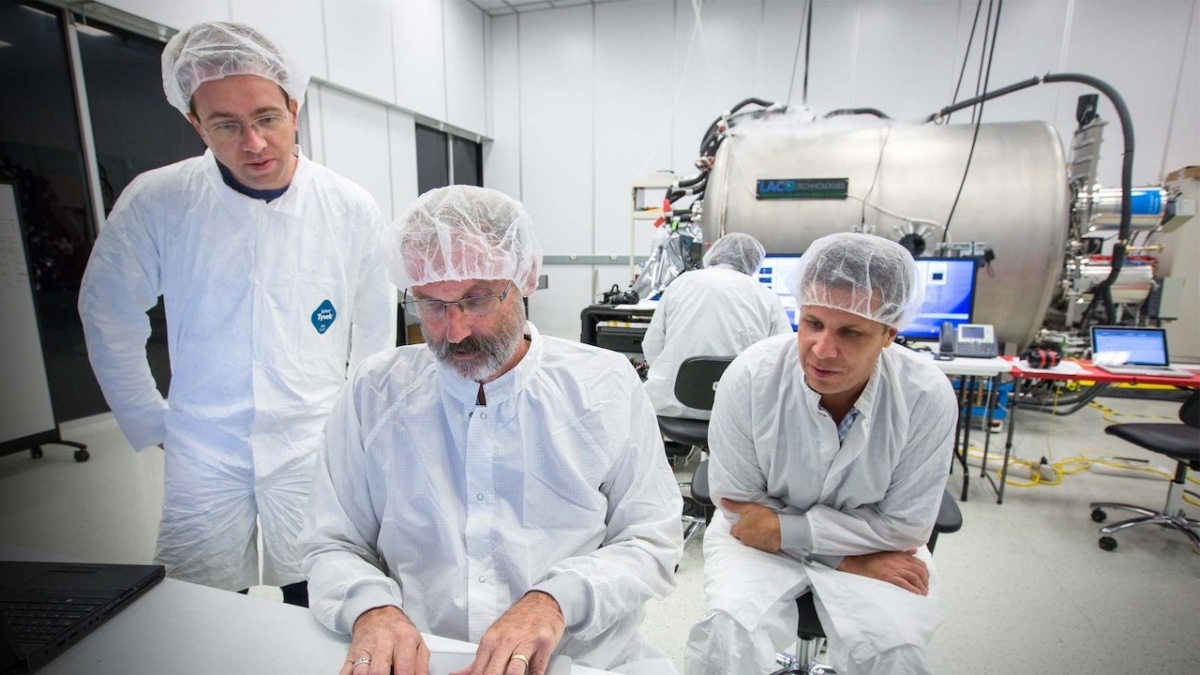ASU graduate’s fascination with space exploration leads to PhD in geological sciences

In the ISTB4 cleanroom. From left to right: School of Earth and Space Exploration PhD graduate Jonathan Hill with Regents Professor Phil Christensen and lead engineer Greg Mehall.
Editor's note: This story is part of a series of profiles of notable spring 2022 graduates.
This spring, ASU alumnus Jonathan Hill will graduate from the School of Earth and Space Exploration with a PhD in geological sciences. He graduated from Arizona State University with degrees in aerospace engineering (2005), geological sciences (2016) and Russian (2005).
In 2010, Hill began pursuing his doctoral degree while working as a mission planner at ASU's Mars Space Flight Facility. Currently, he operates the THEMIS camera orbiting Mars on NASA's 2001 Mars Odyssey spacecraft.
As a senior in high school, Hill had his mind set on attending UC-Boulder for his undergraduate degree. But that all changed when the assistant dean of ASU's Barrett, The Honors College came to speak at his school.
"I was impressed when she said that cameras orbiting Mars were controlled from the building across the street from the honors college dorms," said Hill. "But I never would have imagined that I'd be working in that building five years later helping to control those exact same cameras!"
Hill is part of the Christensen Research Group at ASU, building and using instruments on spacecraft to explore the geology and mineralogy of Mars and other bodies in space. Regents Professor Philip Christensen, a plenary geologist in the School of Earth and Space Exploration, leads this group of scientists and researchers.
"Jon came to SESE with an engineering background and did his PhD on a set of science topics," said Christensen. "This combination of science and engineering interdisciplinary culture is what the School of Earth and Space Exploration is intended to do."
Hill previously operated the mini-TES instruments on the Mars Exploration rovers Spirit and Opportunity for over five years. He will participate in mission operations for the OSIRIS-REx sample return mission to the asteroid Bennu (instrument operations for OTES, the OSIRIS-REx Thermal Emission Spectrometer) and the Europa Clipper mission to Jupiter's icy moon Europa (instrument operations for E-THEMIS, the Europa Thermal Emission Imaging System), once those missions reach their targets.
After graduation, Hill will continue working in the School of Earth and Space Exploration.
He answered some questions about his time here at ASU.
Question: What was your "aha" moment when you realized you wanted to study the field you majored in?
Answer: I've always been fascinated with space exploration, but there wasn't a single event that led me to study Martian geology. After graduating with my undergrad degree in aerospace engineering, I was doing operations on multiple Mars missions. After years of working with so many great Mars geologists at ASU, I realized that I had learned enough from them that I could start contributing to the science side of the missions as well, which led me to pursue my PhD in geological sciences.
Q: What's something you learned while at ASU — in the classroom or otherwise — that surprised you or changed your perspective?
A: My first geology field trip to Death Valley really opened my eyes to the kinds of stories that rocks can tell us, especially how we could learn about other planets by studying similar terrains on Earth.
Q: Which professor taught you the most important lesson while at ASU?
A: As an undergrad, I decided to sign up for a Russian 101 class because I wanted to work for NASA, which works closely with the Russians on the International Space Station. On the first day of class, Dr. Lee Croft introduced himself by saying that he believed that our grades were 50% our responsibility and 50% his responsibility. I had never had a teacher or professor take such clear responsibility for the success of their students before, and I wanted to make sure that I lived up to my half of that deal. Instead of taking just Russian 101, I ended up double-majoring in Russian because I enjoyed the classes and the professors so much!
Q: What's the best piece of advice you'd give to those still in school?
A: It's really easy to get stuck seeing only one path toward your goals. It's often helpful to pause and think about how taking a slightly different approach, or even a drastically different direction forward, might be better for you in the long run.
Q: What are your plans after graduation?
A: I'm planning to continue working as a mission planner for ASU's THEMIS camera currently orbiting Mars, but I want to continue contributing to the science side of the mission as well.
Q: If someone gave you $40 million to solve one problem on our planet, what would you tackle?
A: During my time at ASU, I've really come to appreciate how everyone learns in their own unique way. I would spend that money on increasing the amount of personalized instruction in STEM fields at all levels so more non-traditional learners could enter and contribute to those fields.
More Science and technology

Compact X-ray laser lab aims to reveal deep secrets of life, matter and energy
X-rays allow us to view inside the human body to diagnose broken bones and other hidden problems. More recent X-ray advances are…

Apollo lunar samples enable ASU researcher to pinpoint moon’s crystallization timeline
A team of researchers, including Arizona State University geochemist Melanie Barboni, in collaboration with scientists from The…

NASA launches space telescope to chart the sky and millions of galaxies
California’s Vandenberg Space Force Base was the site for Tuesday’s 8:10 p.m. launch of the NASA SPHEREx mission aboard a SpaceX…

